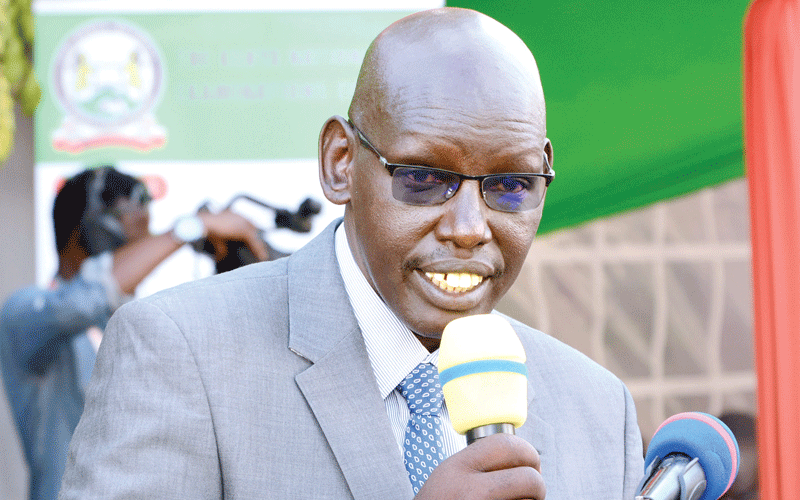How education ministry will spend Sh135b
By Irene.Githinji, May 17, 2023The Ministry of Education yesterday gave a breakdown of how it would spend its Sh135 billion budget.
However, the ministry maintains that it needs an additional Sh43 billion to cater for critical services during the next financial year.
Speaking before the National Assembly Education Committee, the Principal Secretary in the ministry, Belio Kipsang said the Sh135 billion it has been allocated in the 2023-2024 financial year comprises Sh115.773 billion for recurrent and another Sh19.707 billion for development.
The PS outlined that the Sh43b deficit was needed to bridge the deficit in key programmes like Free Day Secondary Education (FDSE) with at least one million learners at the risk of being left out if the money is not availed.
Kipsang said the current enrolment of 3,938,109 at the rate of Sh22,244 gives a total requirement of Sh87.6 billion against the proposed allocation of Sh65.386 billion for FDSE which can only cater for 2,939,489 learners.
“Some 998,620 learners are not covered under the FDSE programme. We need an additional Sh22.2 billion to fully cater for these learners,” explained the PS.
Similarly, there are 20,066 Special Needs Education (SNE) learners in public secondary schools who require a top up capitation at the rate of Sh35,730 giving a requirement of Sh716.95 million against the provision of Sh200 million, Kipsang stated.
“Provision of these funds will facilitate realisation of Article 53 of the Constitution on free and compulsory basic education,” he insisted.
“We are grateful for the continued support the State Department has received. However, the areas we have identified as being under-funded are critical to the achievement of our mandate,” the PS said.
For Junior Secondary School (JSS), Kipsang said there are currently about 1.1 million learners in Grade Seven who will be transiting to Grade Eight within the 2023/24 Financial Year.
He said the capitation requirement at the rate of Sh15,042 is Sh16.166 billion.
Additionally, there are 15,686 SNE learners in Grade Seven who require top up capitation at the rate of Sh35,730, resulting in a requirement of Sh565.9 million.
In January 2024, some 1.3 million learners are expected to join Grade Seven.
The capitation requirement for Terms I and II will be Sh15.776 billion besides the 16,313 SNE learners requiring a top up capitation requirement of Sh582.87 million, bringing the total requirement to Sh31.942 billion.
On exams, the PS said the number of candidates sitting 2023 Kenya Certificate of Primary Education (KCPE) examination is 1,280,782 at the rate of Sh800 per candidate.
This gives a requirement of at least Sh1 billion against a provision of Sh942.1 million.
For those sitting the Kenya Certificate of Secondary Education (KCSE) examination, the number stands at 893,103 at the rate of Sh5,400, which is a requirement of Sh4 billion against a provision of Sh3 billion.
There is also a provision of Sh1 billion to cater for Grade Six learners’ assessment.
He said the department purposes to strengthen delivery of Sciences and Mathematics in the implementation of junior secondary curriculum.
“The department is facilitating construction of Integrated Learning Resource Centres (ILRCs) and also an extra washroom in each school to reduce pressure on existing facilities,” the PS said.
Development budget
Construction of an ILRC and washroom, Kipsang stated, costs approximately Sh1.8 million and Sh500,000 respectively.
In the 2023/2024 budget, Sh3.379 billion has been allocated to cater for this cost and priority will be given to schools that are not close to public secondary schools.
According to the PS, the Ministry requires an additional Sh42.043 billion and Sh1 billion under recurrent and development budgets respectively.
The PS, however, stated that there is a notable increase in the recurrent budget of Sh9.089 billion from the current financial year to the next budget.
According to the PS, the main areas of increase are Sh5.887 billion for capitation to junior school learners, Sh964 million for FDSE capitation and another Sh300 million to cater for quality assurance and standards.
Similarly, Sh173 million will go towards supporting co-curricular activities, Sh444 million under Personnel Emoluments for recruitment of Quality Assurance and Standards Officers and Sh470 million for supply of sanitary towels.
The PS also said that under the development budget, the department allocation reduced by Sh4.071 billion.
“The main reduction was under the Secondary Education Quality Improvement Project of Sh8.912 billion, which is scheduled to end in the financial year 2023/24. However, the department received an additional Sh4.7 billion for implementation of Kenya Primary Education Equity in Learning Program,” the PS explained.
The department has proposed Sh940 million for sanitary towels, with the PS saying the programme provides seven packets to girls in Class 6, 7 and 8.
At least Sh399 million has been proposed for co-curricular activities to cover regional, county and sub-county levels.
The department said a proposed Sh335 million is to cover quality assurance and standard, which caters for the increased need for assessment as a result of CBC in pre-primary, primary, secondary and teacher training colleges.
Kipsang said the basic education department will implement Bottom –Up Economic Transformation Agenda (BETA) through automation of education systems.
